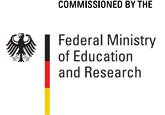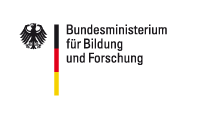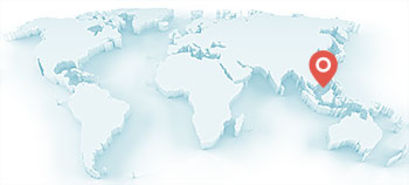The English version of this call text is for information purposes only and not legally binding.
4 October 2016
1 Funding purpose and legal basis
1.1 Funding purpose
The Asia-Pacific region is becoming one of the most influential regions in the world, not only in eco-nomic terms but also with respect to science. It has been shaped by a rapid expansion of its research systems, the growing prominence of individual countries in science and education as well as a steady increase in intra-Asia-Pacific cooperation. As a result, today it stands alongside Europe and North America as the third-largest global powerhouse in terms of research and development.
The two key developments – rapidly increasing significance and increased regional cooperation – offer many opportunities for closer collaboration. The knowledge-based, technology-driven economy of the Federal Republic of Germany should maintain the best possible connections with the producer states of new knowledge and the current and future innovative centres of the world. The funding measure forms part of the framework of the strategy of the German Federal Government for the internationalisation of science and research and of the BMBF action plan “International Cooperation”. Its purpose is to promote greater cooperation to mutual benefit with the best institutes in Asia.
The overall aim of the funding measure is to strengthen the internationalization of German education and research institutions, improve their competitiveness in Asia/Oceania and facilitate access to re-search institutions and networks in Asia for German scientists.
The funded projects are also intended as preparation for further applications to the BMBF or other fund organisations such as the German Research Foundation (DFG) or the European Union.
The funding measure supports German universities and research institutions which aim to set up a research presence in a target country. Joint projects pay particular attention to the scientific excellence of the partners.
1.2 Legal basis
Federal grants are awarded based on this guideline, §§ 23 and 44 of the German Federal Budget Code (BHO) and the related administrative regulations (VV) as well as the BMBF “Guidelines for Funding Applications on an Expenditure Basis (AZA)" or "Guidelines for Funding Applications on a Cost Basis (AZK)". There is no legal entitlement to funding. The approval authorities make a decision at their own proper and dutiful discretion and within the framework of the budget funds available.
2 Object of funding
The BMBF is providing funds for German universities and German research institutions to develop research presences in cooperation with leading research institutions in Australia, China, India, Indo-nesia, Japan, Republic of Korea, Malaysia, New Zealand, Singapore, Thailand, Vietnam in areas of common strategic significance:
- Health research and medical technology,
- sustainable cities,
- renewable energies and energy efficiency,
- environmental technologies and hydrotechnologies.
Projects in other research areas can only be considered in special cases.
The research presences to be established in a partner country can e.g. be joint research groups, la-boratories, testing institutions, communication platforms, research stations, trial facilities or cooperation networks. These new presences should be based on existing contacts and projects. However, projects which have already commenced will not receive funding.
Funding relates to staff costs for project coordination, staff exchange and event-related spending/costs in the context of networking and targeting measures. The goals of the measures being planned are:
- to develop and/or expand long-term research presences with leading research institutions in the target countries,
- to establish a sustainable and visible German presence in the partner country,
- to improve awareness of Germany’s scientific excellence in the partner country,
- joint contribution to strengthening the innovation systems in Germany and the partner country for mutual benefits,
- to increase knowledge of the state of research in the respective partner country and the general conditions that apply
- to internationalise research in Germany.
The applicants must already present a concept in their funding applications on how their research presence will continue to be financed after the end of the funding period.
3 Funding recipients
Universities, non-academic research institutions and other institutions making contributions to research can submit applications if their project matches the purpose of the grant and the grant conditions. Research institutions that receive basic federal and state funding are only entitled to receive project funding above and beyond their basic financing for their additional expenses project-related expenditure or costs under certain circumstances.
4 Funding prerequisites
The draft project must be submitted by the German applicant. In order to receive funding to prepare joint research presences, the cooperation partners must generally agree on their planned cooperation and must be in line for complementary funding for the Asian-Pacific partner from a funding institution in the partner country. This funding is not intended to finance foreign partners based on the resources of this funding measure. A cooperation agreement/ Letter of Intent must be added to the application. Additional partners can participate in the research project if this is beneficial for the project and the additional partners are contributing their own resources.
Projects for which an application is submitted in the context of this announcement should document the potential for long-term, sustainable cooperation.
The grant recipients are obligated to participate in potential evaluation measures and to provide in-formation to evaluate the success of the funding measure.
5 Nature, scope and amount of funding
Funding can be granted through project funding as non-repayable subsidies. Projects should be split into two phases. Funding amounting to EUR 100,000 is made available per project and year during the two-year start-up phase, followed by EUR 150,000 per project and year during the three-year consolidation phase. Funding usually runs for 5 years.
During the start-up phase, projects are evaluated in order to assess the sustainability of the measure. Funding during the consolidation phase is dependent on the result of the evaluation.
The criteria applied are e.g.:
- The implementation level of the research presence
- The number of joint, newly initiated or planned research projects
- The number of joint publications
- The third-party fund acquisition concept
- Co-financing or own investment of foreign partners.
Funding for universities, research and scientific institutes and comparable institutions is calculated on the basis of the eligible, project-related expenses (the eligible, project-related costs for Helmholtz Centres - HZ - and the Fraunhofer Institute - FhG-) that can be individually funded up to 100%.
As a rule, the funding is provided for the following expenses/costs that are eligible for funding:
- trips and stays of German scientists and experts
The following applies to trips and stays by German scientists and experts:
Travel costs and expenses including the necessary visas (for flight tickets: Economy class) to and from the destination in the partner country as well as country-specific daily allowance http://internationales-buero.de/media/content/Tagespauschalen_neu.xls are paid. Contributions towards health insurance and, if applicable, other insurance policies are covered by these flat-rate amounts and must be paid for by the recipient of the funding.
The country of origin pays for the travel costs/expenses and stays of foreign project scientists and experts. - Workshops
Workshops with known partners, or those aiming to take advantage of new potential coopera-tion, can be supported as follows in Germany and in the partner country:
Various expenses and costs to hold workshops can be paid. Support is paid e.g. for guest ac-commodation, transfers, provision of workshop documents, appropriate catering and room rental. The amount of the subsidy depends on the size of the event and the number of foreign guests. In these cases, no daily allowance (cf. a) will be paid. - project-related materials and equipment
Project-related material grants (e.g. for consumables, business materials, literature, sub-orders) may be granted within a limited scope (up to a max. of 10% of the funding total). In principle, costs will not be borne or subsidised for normal basic equipment of the participating institutes. - Coordinating staff for international networking
Funding for project-related spending/costs for scientific staff is awarded primarily to coordinate the start-up and development of the research presence.
Since this is a networking and targeting measure, and as such not an original research project within the meaning of the guidelines for funding on an expenditure basis, no project flat rate can be granted to universities and university hospitals.
6 Other funding provisions
The “Allgemeine Nebenbestimmungen für Zuwendungen zur Projektförderung” (ANBest-P) [General Auxiliary Conditions for Grants Provided for Projects] will form part of a funding decision on an ex-penditure basis.
The “Nebenbestimmungen für Zuwendungen auf Kostenbasis des BMBF an Unternehmen der gew-erblichen Wirtschaft für FuE-Vorhaben” (NKBF98) [General Auxiliary Conditions for Funds Provided by the BMBF to Industrial Companies for Research and Development Projects on a Cost Basis] will form part of a funding decision to the Frauenhofer Institute or the Helmholtz Institute.
7 Procedure
7.1 Involvement of a project management agency, application documents, other documents and use of the electronic application system
The BMBF has commissioned the following with processing the funding measure:
DLR Project Management Agency
European and international cooperation
Heinrich-Konen-Strasse 1
53227 Bonn, Germany
Website: http://www.internationales-buero.de
Contacts:
Scientific contact:
Dr. Sabine Puch
Telefon: +49 2 28/38 21-14 23
Telefax: +49 2 28/38 21-14 44
E-mail: sabine.puch@dlr.de
Administrative contact:
Claudia Gruner
Telefon: +49 2 28/38 21-14 06
Telefax: +49 2 28/38 21-14 44
E-mail: claudia.gruner@dlr.de
Any changes will be announced in the Federal Gazette or in a different suitable manner.
The electronic draft tool PT-Outline must be used to create project drafts, and formal funding applications must use the electronic application system “easy-online”.
Please contact the project management agency for advice on your application. The agency can also provide ¬further information and explanations..
7.2 Two-step process
The application process consists of two steps.
7.2.1 Submission and selection of draft project plans
In the first process step, the project management agency must first receive the draft project in a written and an electronic format by 20/12/2016
using the draft tool pt-outline (https://secure.pt-dlr.de/ptoutline/app/users/login/APRA2016) letter/cover letter must be attached to the draft on which the applicant confirms by signing that he acknowledges and confirms that the statements made in the draft are correct.
Project drafts received after the above time may no longer be considered.
Projektskizzen, die nach dem oben angegebenen Zeitpunkt eingehen, können möglicherweise nicht mehr berücksichtigt werden.
The project draft should be no more than ten pages long. The draft should present the following aspects of the project:
- Information on the project coordinator and the German and foreign project partners
- Brief presentation of the scientific project aim
- Details relating to the interested party’s science and technology level (e.g. preparatory work, existing findings, previous experience) regarding the research topics mentioned
- Meaningful presentation of the intended research presence
- Description of the planned work steps of the project (design, targets, structure and type of structural measures)
- Evaluation of utilisation and application options
- Added value of international cooperation
- Estimated spending/costs (expected funding requirement)
The received draft project plans are evaluated according to the following criteria:
- Compliance with formal application requirements
- Correspondence with the announcement funding objectives and the funding subject mentioned in Item 2
- Technical quality and originality of the project
- Qualification of the applicant and the German and international partners involved
- Research presence design
- Quality of the co-operation and added value for the partner institutions
The draft projects suitable for funding are chosen based on the above criteria and evaluation. Appli-cants will be informed of the selection outcome in writing.
No legal right applies to a return of the submitted draft project or any other submitted documents submitted as part of the process step.
7.2.2 Submission of official funding applications and decision-making procedure
In the second step of the procedure, the author whose draft project received a positive assessment will be asked to submit a formal funding application. A decision will be reached on this funding application following the final review.
The official funding applications are to be created using the “easy-online” electronic application system.
Guidelines, instructions, information and supplementary provisions can be accessed online at
https://foerderportal.bund.de/easy/easy_index.php?auswahl=easy_formulare&formularschrank=bmbf.
A project description in German must be attached to the formal application. This should be no more than ten pages and have the following content:
- Cooperation aims
- Cooperation experience, previous collaboration
- Detailed project description and work steps of the cooperation project including content and deadline milestone plan
- Detailed work and time plan
- Project-related resource planning
- Added value of international cooperation
- Experience of the international partners in the cooperation and their contributions to the project
- Plan to consolidate the research presence with the partners beyond the funding period
- Planned extension of the cooperation to other institutes and networks
- Reasons why the funding is needed
The received applications are evaluated and checked according to the following criteria:
- Compliance with formal requirements
- Contribution to the measure to intensify the science and technology cooperation
- Contribution to consolidating bilateral/international partnerships and preparing and setting up new international partnerships
- Applicant’s experience in international cooperation
- Quality of the co-operation and added value for the partner institutions
- Appropriateness and necessity of the funding that has been applied for
- Security of the overall financing of the project for the entire duration
A decision will be reached after final evaluation of the application on the basis of the criteria specified above and the evaluation.
7.3 Regulations to be observed
Insofar as divergence from this is not authorised in this funding regulation, the administrative reg-ulations under section 44 of the German Federal Budget Code (Bundeshaushaltsordnung – BHO) and sections 48 to 49a of the Verwaltungsverfahrensgesetz (German Administrative Procedures Act) apply for the authorisation, payment and settlement of the funding as well as for verification and the examination of the use of and, if applicable, the necessary reversal of the funding decision and the reclamation of the granted funding.
8 Entry into force
This guideline comes into effect on the date of publication in the Bundesanzeiger (German Federal Gazette).
Bonn, 4 October 2016
German Federal Ministry
of Education and Research
On behalf of
Dr. L. Mennicken










